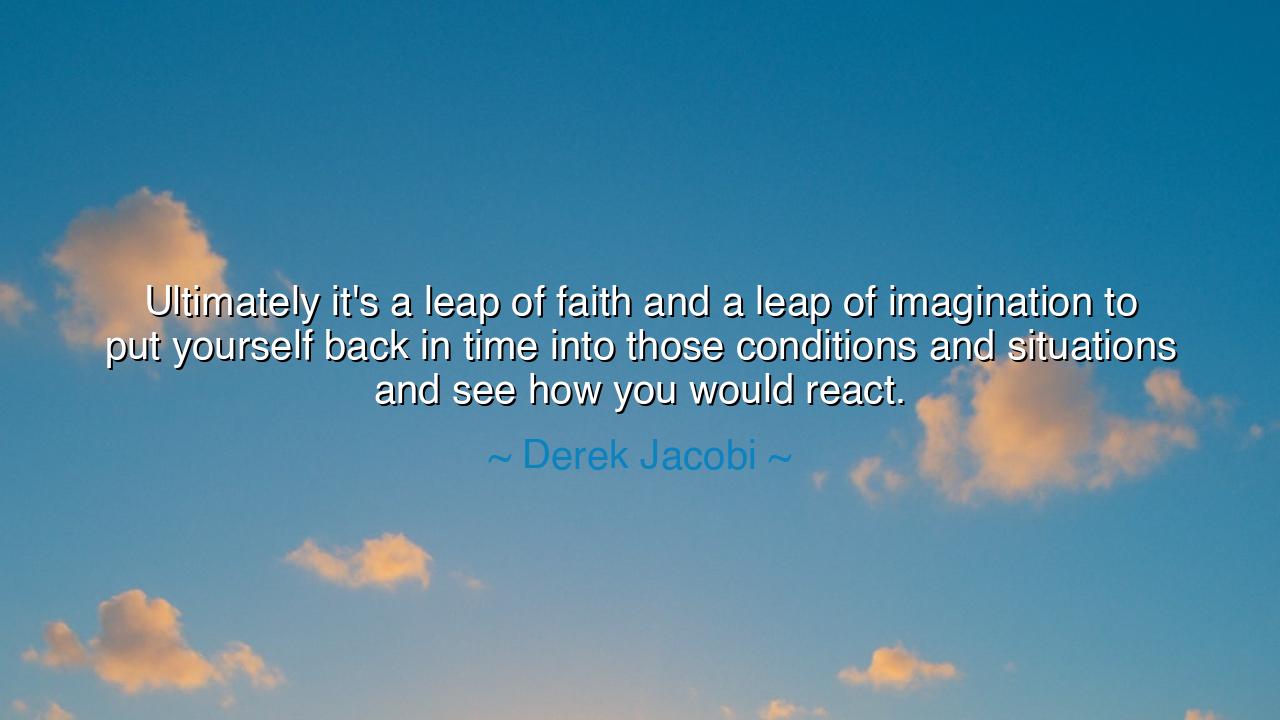
Ultimately it's a leap of faith and a leap of imagination to put
Ultimately it's a leap of faith and a leap of imagination to put yourself back in time into those conditions and situations and see how you would react.






The words of Derek Jacobi — “Ultimately it’s a leap of faith and a leap of imagination to put yourself back in time into those conditions and situations and see how you would react.” — are more than the reflection of an actor; they are a meditation on the sacred art of understanding. To truly step into the past, one must go beyond costume and story — one must summon both faith and imagination, the twin wings by which the soul crosses the gulf of time. For without faith, the heart hesitates to believe that what once was can still live; and without imagination, the mind cannot breathe life into the bones of history.
From the dawn of memory, humankind has sought to know what came before. The ancients built monuments not only to preserve their deeds, but to invite future generations to imagine them anew. The actor, the historian, the philosopher — all are pilgrims of time, wandering the ruins of forgotten empires, listening for the echo of human truth. To re-enter those moments, to feel as they felt, requires a courage of spirit — a leap of faith — for we must let go of what we know and surrender to what once was. It is not knowledge alone that bridges centuries; it is empathy born from imagination.
Consider the example of Derek Jacobi himself, who breathed life into kings, warriors, and philosophers long buried beneath the dust of ages. When he portrays Claudius, the hesitant emperor, or Hamlet’s haunted mentor, he does not merely act; he travels inward, seeking the pulse of humanity that beats across millennia. This journey demands not imitation, but transformation — to feel as another felt, to think as another thought. It is, indeed, a sacred leap of imagination, one that all who seek wisdom must one day attempt.
History is not a scroll of dead names; it is a mirror. And only by daring to look into it — to imagine ourselves within its scenes — can we understand who we are. Think of Anne Frank, whose words, written in the shadow of despair, still invite each reader to step into her small, hidden world. Every person who opens her diary performs a quiet act of faith, asking, “What would I have done? How would I have endured?” Thus, imagination becomes the bridge between eras, and faith becomes the courage to feel another’s truth as our own.
The ancients taught that memory and prophecy are born from the same fire. To imagine the past is to awaken wisdom; to imagine the future is to shape destiny. Those who can see through the eyes of the dead will never live blindly. Those who can feel the hearts of the forgotten will act with compassion in the present. It is through this leap of empathy that the human spirit grows eternal, weaving the old and the new into one living story.
Yet this act of imagination requires humility. One must kneel before time itself and admit, “I do not know — but I will try to understand.” Too often we judge the past by the light of the present, forgetting that those who lived before us walked beneath different skies. The wise do not condemn the ancients; they listen to them. They seek to learn what choices were made, and why, and in that reflection, discover how they themselves might act when tested by fate.
Therefore, let this be the lesson: to know yourself, you must imagine others; to grow, you must believe in what you cannot see. Read the chronicles of history not as cold record but as living testament. When you hear of heroes and tyrants, of saints and sinners, ask not only, “What did they do?” but “What would I have done?” Such questions awaken the moral imagination — the truest education of the soul.
And so, the teaching endures: every act of understanding, every work of art, every whisper of empathy is a leap of faith and imagination. Take that leap, again and again. For it is in leaping — across centuries, across minds, across the boundaries of self — that we remember our shared humanity. The past is not gone; it waits for us to believe in it once more.






AAdministratorAdministrator
Welcome, honored guests. Please leave a comment, we will respond soon